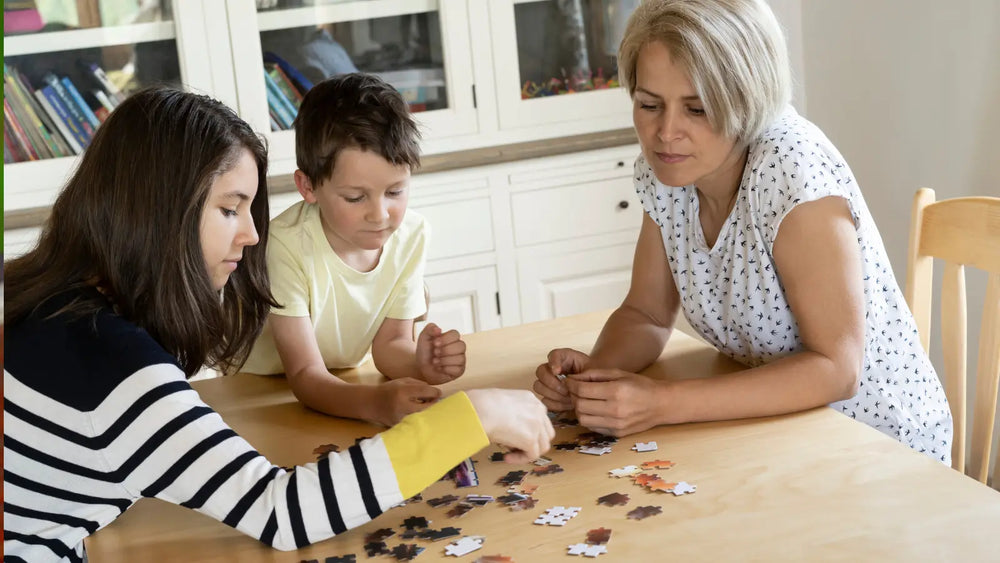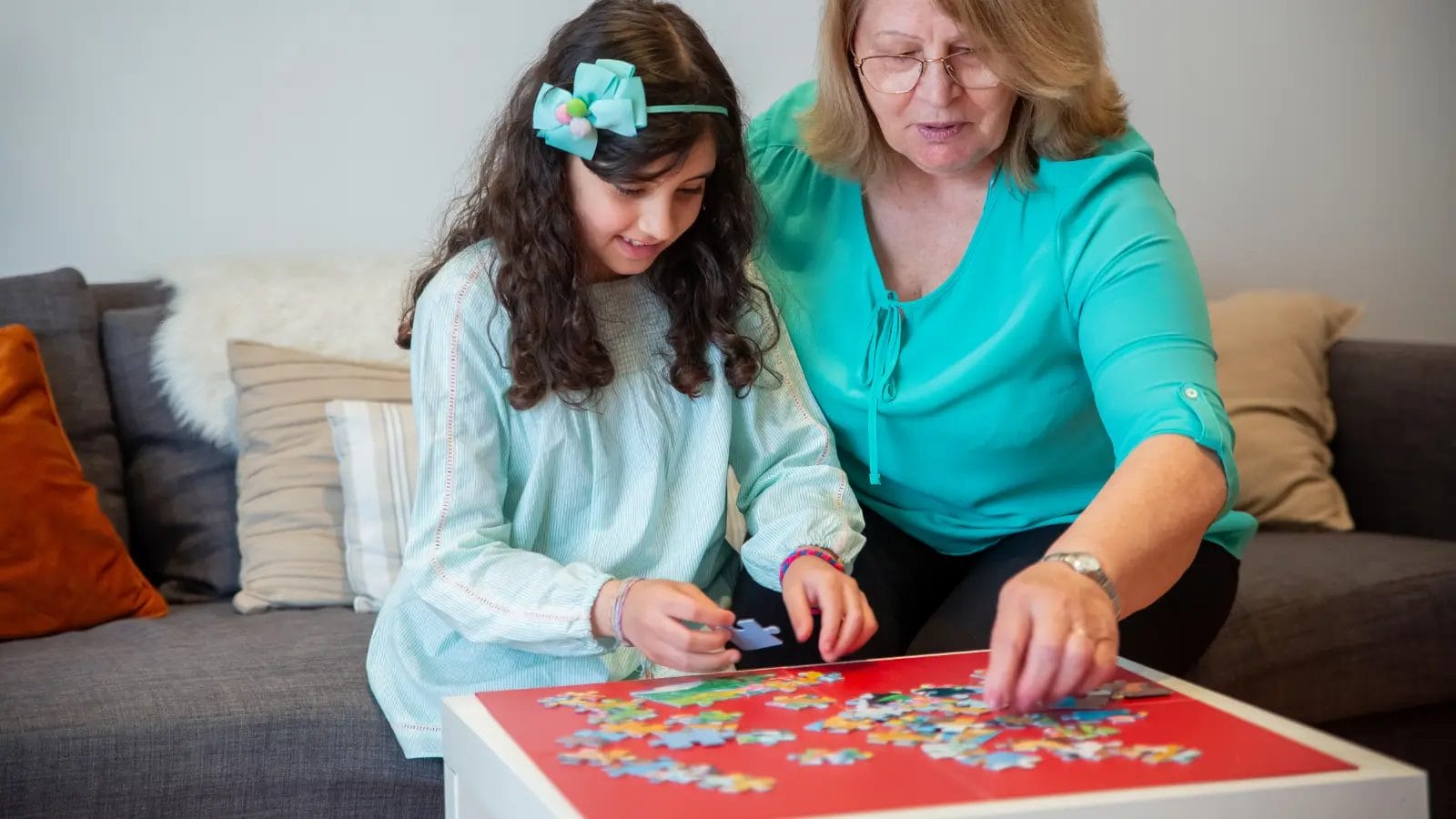
Solving jigsaw puzzles is more than just fun. It's a great way to build essential skills. When you play with them, you make your brain stronger. Jigsaw puzzles help both kids and adults learn valuable skills. They allow you to remember things better and feel happier. Puzzles can even make you smarter by using different brain skills.
So, what skills do jigsaw puzzles help you to develop? They improve how you see space, focus, and solve problems. This makes them perfect for keeping your mind active.
Key Takeaways
- Jigsaw puzzles challenge you to think critically and explore different solutions, enhancing your problem-solving ability.
- Assembling puzzles improves fine motor skills, which is essential for writing and sports activities.
- Completing puzzles teaches resilience and the importance of persistence in overcoming challenges.
- Engaging with puzzles can be a calming activity that reduces stress and promotes relaxation.
- Working on puzzles with others fosters communication, teamwork, and the ability to share ideas and celebrate collective success.
What Skills Do Jigsaw Puzzles Help You to Develop? 10 Skills

1. Problem-Solving
Doing a jigsaw puzzle is like solving problems. Each piece is a small challenge, and you must find its spot. This helps you think better and try different ways to solve things. You learn to test ideas, which makes your trial-and-error skills better. Working on puzzles teaches patience and not giving up, which are important for challenging problems in life.
2. Memory Boost
Jigsaw puzzles help improve cognitive skills like boosting memory. As you look at pieces, you remember shapes and colors. This makes your short-term memory stronger. Doing puzzles often can lower the risk of brain problems like dementia. Keeping your mind busy strengthens brain cell connections, which keeps memory sharp.
3. Detail Focus
Solving jigsaws needs careful attention to detail. You have to see slight differences in pieces to fit them right. This skill is helpful in real life for work or school tasks where detail matters. By noticing little things, you get better at focusing and staying on task. Being good at details can improve how well you do in many areas of life.
4. Visual-Spatial Reasoning
When you do puzzles, you get better at seeing how pieces fit. You learn to picture the whole puzzle in your mind. This helps in real life, like when driving or reading maps.
Puzzles train your brain to spot patterns and shapes. This makes it easier to solve problems needing spatial skills. They help you think in 3D and improve brain function.
5. Hand-Eye Coordination
Jigsaw puzzles are great for hand-eye coordination. Picking up pieces and placing them correctly improves fine motor skills, which are essential for writing or sports.
By doing puzzles, you match what you see with hand movements. Kids benefit as they grow; adults also keep their motor skills sharp.
6. Patience and Perseverance
Solving puzzles needs patience and not giving up. You stay focused even when it's tough. This skill helps you tackle hard tasks without quitting.
Finishing a puzzle builds strength to keep going. These traits are key to reaching goals and overcoming challenges.
7. Stress Relief and Relaxation
Doing jigsaw puzzles makes you feel calm. Putting pieces together helps you relax and forget stress. You focus on the puzzle, which can lower worry levels. Puzzles are great to relax after a busy day. As you find the right pieces, your mind breaks from daily worries. This skill is vital for staying mentally healthy and living a balanced life.
8. Sense of Achievement
Finishing a jigsaw puzzle makes you feel proud. Each piece brings you closer to completing the picture. This success boosts your self-esteem and confidence. Seeing your hard work pay off motivates you to face more challenges.
9. Teamwork and Collaboration
Jigsaw puzzles aren't just for one person. They let you work with others, building teamwork skills. When solving puzzles with family or friends, you learn to talk and share ideas. You discuss plans and celebrate wins together, strengthening bonds.
This is an essential skill in personal and professional life. Working on puzzles together teaches you to value different views and build stronger relationships.
10. Sharing and Working Together
Jigsaw puzzles are great for learning to share and work together. When you do puzzles with others, you learn to share pieces and space. This helps you talk better and decide who works on which part.
- Sharing Pieces: You and your friends might want the same piece. This makes you share and take turns, helping everyone get along. Sharing is important for making friends and working in groups.
- Planning Together: You might have different ideas for solving the puzzle. Talking about these plans helps you listen to each other and agree on a way forward. This skill is helpful in school projects or jobs.
- Enjoying Success as a Team: Finishing a puzzle together feels great. You learn to be happy for everyone's success, not just your own. This shared happiness strengthens teamwork.
By doing puzzles with others, you get better at sharing and working as a team. These skills help in solving puzzles and in everyday life, too.
The Future of Jigsaw Puzzles
Jigsaw puzzles have been around for a long time. They're not old-fashioned; they're changing and getting more fun. Let's see what's new in these brain games.
- Digital Puzzles: Today, digital puzzles are popular. You can solve them on tablets or phones. This means you can puzzle anywhere, anytime. Digital puzzles have hints and timers, making them exciting.
- Augmented Reality (AR) Puzzles: Imagine pieces coming to life! AR makes this happen. With AR puzzles, you see animations as you piece them together, which adds fun and learning.
- Personalized Puzzles: Personalized puzzles are growing in popularity. Make a puzzle from your favorite picture or art. It's unique and special, letting you relive memories while puzzling.
- Eco-Friendly Puzzles: People now care more about the Earth, so eco-friendly puzzles are in demand. These use green materials and packaging, allowing you to puzzle while helping the planet.
- Educational Puzzles: Educational puzzles are big in schools and homes now; they make learning fun! Covering subjects like math or science makes learning enjoyable.
- Brain Health Puzzles: As we get older, keeping our brains working is important. Brain health puzzles help with that by improving memory or problem-solving skills regularly!
In short, puzzles aren't just hobbies but valuable tools for fun and learning! Whether tech-savvy or eco-friendly, there's something here for everyone!
Conclusion
Jigsaw puzzles are fun and help you learn many skills. You don't just have fun; you improve at solving problems, critical thinking, and working with others. Doing puzzles with family or friends helps you talk and work together. It's a great way to connect without using screens.
Try jigsaw puzzles to boost your brain power and feel proud when you finish them.